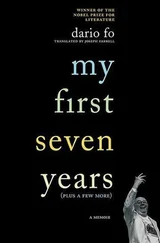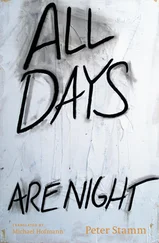I got to the café before Sonia, and watched through the window as she crossed the street toward me. She was wearing white pants and a white sleeveless T-shirt, and she was tanned. When she walked into the café, the whole place turned to stare. She came up to my table and brushed a kiss on my cheek. As she sat down, she looked briefly around, as though searching for someone. The waiter was at hand before I could even call him.
Sonia talked about a competition she wanted to enter, a day care for a big industrial company. She put on her glasses, which I liked her even better in, and showed me her sketches. I made a couple of suggestions, which she turned down. I’d had better ideas before, she said. I told her I hadn’t been sleeping well. She looked at me with mock sympathy, and went on talking about her project and integration and shelter and the personality of the children and their uniqueness and potential. My client is the child, she said, and pushed her glasses up over her hair, and laughed.
Sonia was the absolute opposite of Ivona. She was lovely and smart and talkative and charming and sure of herself. I always found her presence somewhat intimidating, and I had the feeling of having to try to be better than I actually was. With Ivona, the time went by incredibly slowly, full of painful silences. She gave monosyllabic replies to my questions, and it was a constant struggle to prolong the conversation. Sonia on the other hand was the perfect socialite. She came from a well-off background, and I couldn’t imagine her doing or saying something unconsidered. She was bound to have a successful career. She would find a niche in the design of social housing, and get a seat on various boards, and bring up two or three children on the side, who would be clean and just as well-behaved and presentable as she was. But Sonia would never say to a man that she loved him, the way that Ivona had said it to me, as if there was no other possibility. Ivona’s declaration had been embarrassing, just like the idea of being seen in public with her, but even so the thought of her love had something ennobling about it. It was as though Ivona was the only person who took me seriously and to whom I really meant something. She was the only woman who saw me as something other than a good-looking kid or a rising young architect. Ever since waking up, I kept thinking of her, and I was sure I would have to see her again, if only to free myself from her. She had told me she worked in a Christian bookstore. It couldn’t be all that hard to find her.
Sonia was talking about a torchlight parade that she had gone on, for the victims of the Tiananmen massacre. The night I had spent with Ivona she and a few like-minded people had marched from Goetheplatz to Marienplatz, and had marked the Chinese sign for sorrow in lighted candles on the square. According to Buddhist beliefs, the souls of the deceased would go looking for a new body at the end of forty-nine days, she said. It was so moving, I cried. She seemed to be surprised by her own emotional outburst. I only hope your soul doesn’t find a new body for itself, I said, that would be a shame. Sonia looked at me as if I’d personally shot down the Chinese students. I’ve got to go, I said. She asked me if I planned on going to Rüdiger’s farewell party. I couldn’t say yet.
I found three Christian bookstores listed in the phone book. I went to the first of them, but they said they didn’t give out information about people who worked there. I took a look around the place. When I didn’t see Ivona anywhere, I went to the next place. The manager here wasn’t so cagey. He said he didn’t have any Polish girls working for him, and there wouldn’t be any at the Claudius bookstore, the third one on my list, either, because that was Protestant. He thought about it for a moment. The parish church of St. Joseph in Schwabing had a small shop attached to it, where they sold books and knickknacks. Maybe my girlfriend worked there. She’s not my girlfriend, I said.
I had to go once around the church before I saw the store. It was in an adjacent building, in a small recess. A couple of steps led up to the door next to a display window with a few candles and a couple of yellowed-looking pamphlets. Jesus and TV, I Lift Up Mine Eyes to Thee, The Everlasting Bond , things like that.
I looked through the glass door but saw no one. When I walked in, I set off a little bell. It took a moment, and then the velvet curtain parted at the far end. The back room was in bright sunlight, and for an instant Ivona looked like an apparition, bathed in light. Then the curtain fell shut behind her, and the room was once again in dimness.
Ivona looked at me attentively, and without a trace of recognition. She sat down on a chair behind the counter and busied herself by straightening some stacks of miniature saints’ pictures. I looked at the books, which were arranged by theme on a couple of shelves: Mission, Help through Faith, Marriage and Family, Sects and Other Religions. There was even a category called Witty and Provocative. I pulled down a book of clerical jokes. On the cover there was a drawing of a lion kneeling down before a priest, paws folded in prayer. I put it back and turned to Ivona. She still wasn’t noticing me. I went over to the counter and stared at her until she raised her eyes. My image of her had changed in memory, and seeing her in front of me now, I wondered how I could possibly have wanted her so much yesterday. Her expression was anxious, almost submissive, and I felt disgusted by her again. Without a word I left the shop. After a few feet, I turned and looked back. Ivona was standing pressed against the glass door, she looked satisfied, or perhaps just apathetic, as though she really didn’t care whether I stayed or left, as though she knew for sure that I would be back.
I went home and took out my thesis again. In three days’ time I would have to defend it, and I had the feeling I had forgotten everything I had pondered over the last few months. I leafed through the drawings and sketches. Rüdiger was right, my design was derivative, it lacked originality and force. While I’d been working on it I’d been conscious of a vague energy, a creativity, but I hadn’t known in which direction to take it. And then, without my really knowing it, I’d followed my idol. It wasn’t even Rossi’s buildings that impressed me so much as his polemics against modernism, his melancholy which maybe wasn’t anything more than cowardice. Sonia had often poked fun at my old-fashioned taste. She said Rossi’s buildings looked as if he’d taken out his children’s building blocks and played with them.
My work looked shallow and unimaginative to me. Even so, I felt pretty sure I would pass. But it bothered me just being mediocre, and to have to admit to myself that I wasn’t the genius I always dreamed of being. Feeling rather disgusted with myself, I put away the papers. I thought of Ivona and tried to sketch her face from memory, but it was more than I could do. I called Sonia, but there was no answer. I ate a snack, and then took myself for a walk. I avoided those places I normally went to with Rüdiger and Ferdy, I didn’t feel like running into them in case they asked me some uncomfortable questions. I walked through the city, feeling very much alone. I was shocked to realize that there was only one person I wanted to see, and that was Ivona.
It took me a while to find the student residence. The doorbells only had numbers next to them, no names, and I had no idea what Ivona’s number was. I stood in front of the residence, smoking. Finally a young woman came out, and I managed to wedge my foot discreetly in the door before it snapped shut. I stood there while she unlocked her bicycle and rode away.
The buildings must have been from the fifties, the floors were tiled gray, the white on the walls had yellowed, and the banisters’ plastic insulation had been worn away in places, showing the metal below. Even though I’d been pretty drunk on the occasion of my first visit, I found Ivona’s room without much trouble. On the door was a little number plate, like in a hotel. Below that, Ivona had put her own name, with a difficult surname written out in a childish hand, which I forgot right away and don’t know how to spell to this day. I knocked, and Ivona let me in. She didn’t say anything, but she stepped aside and let me in, as though she’d been waiting for me. The TV was on, some historical costume drama with romantic music. I shut the door behind me and went up to Ivona, who shrank back, with a sort of cunning expression on her face. When she reached the window she couldn’t go any farther, and I seized her hands and kissed her palms and her soft whitish arms. Ivona squirmed a little, then she seemed to give in, and dragged me away from the window. She moved to the bed and fell back into it without taking her eyes off me. Her expression was vacant, like an animal’s. I lay down on top of her and went on kissing and embracing her and felt through her thin top for her breasts. She let it happen, only when I tried to undress her she resisted, just as determinedly as the first time. In the background, the music swelled to some sort of crescendo, the film was reaching its high point, or perhaps it was just over. I was very turned on, but it wasn’t the standard feeling of being with a girl, not a physical excitement, but excitement of feeling, a warm, dark sensation, a kind of overwhelming safety. I felt no shame as I pulled off my clothes, even though I guessed how ridiculous we must look, a naked man rubbing himself against a woman in ugly old-fashioned clothes. I couldn’t care less. Ivona was breathing deeply in and out, her hands were clasped across my back, as though to hold me to her. Without anything happening, I had the feeling she was giving herself to me.
Читать дальше












